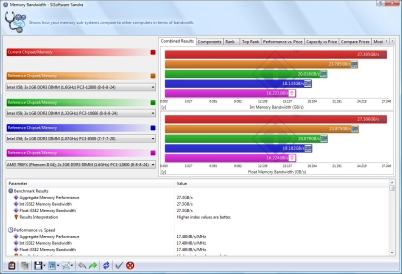SiSoft Sandra
Download from: www.sisoftware.netSiSoft Sandra is possibly the most famous benchmarking tool and, like Lavalys Everest, has tools to gauge the theoretical performance of every sub-system and component in your PC. Sandra is multi-threaded and we use it to gauge the unbuffered memory performance and the latency of the memory latency.
To run the unbuffered memory test, open the Benchmarks screen, go into the Options and deselect buffering. This will give a more accurate and consistent reading of memory throughput. Then enter the Graphs menu and deselect Animate Controls and Animate Tools - these options are just annoying.
Hit F5 to run the benchmark and once it's finished enter the Graph menu and keep pressing Change Controls Mode until the graphs look like those below. You can now average the Internal Memory Bandwidth and Float Memory Bandwidth numbers to give the unbuffered memory performance.
The latency test is much easier to run - find the Memory Latency tool on the Benchmarks page and just run it by hitting F5. The latency is the top result in the text window.
There's even less distinction between the memory performance of the Core i7 CPUs in Sandra - there's just tens of MB/s difference despite the higher frequencies and fatter memory bus of the Extreme Edition CPUs. Again AMD's dual-channel memory controller can't compete with the huge amounts of bandwidth of the triple-channel Core i7 controller. Sandra also doesn't believe Everest's evaluation of the latencies of AMD's memory controller, calling it significantly slower than Intel's.
With all the CPUs overclocked, the higher memory frequency of the Core i7 920 comes to the fore (see page 3 for more on this) - if only we had faster memory for the EE CPUs and didn't have to drop the memory to around 1,400MHz.

MSI MPG Velox 100R Chassis Review
October 14 2021 | 15:04










Want to comment? Please log in.